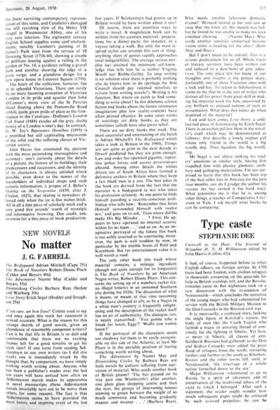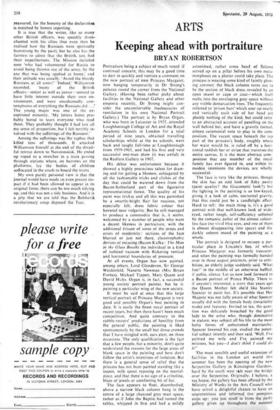Type caste
STEPHANIE DEE
Farewell to the Don: The Journal of Brigadier H. N. H. Williamson edited by John Harris (Collins 42s)
It had, of course, happened before to other English officers on foreign service. In 1793 there had been Toulon, with civilian refugees in thousands screaming on the quayside for help as British warships left, and the Revolu- tionaries came in. But nightmare took on a new dimension with the evacuation of Novorossiisk—which concludes the narrative of the young major who had volunteered for service with the British Military Mission to the Don Cossacks in the Russian civil war.
It is, necessarily, a confused story, lacking the single figure of Kolchak's stature, the body of men like the Czech Legion who fuinish a tragic or amazing thread of con- tinuity for the fighting in Siberia. Yet here. :is never in Siberia, all classes of anti- Bolshevik Russians had gathered; to the Don and Kuban Cossacks were added the great flood of refugees from the north, retreating further and further to the south-as Kharkov. Rostov and the other towns fell, until. at Novorossiisk. 'the wreckage of a whole nation funnelled down to the sea.'
Major Williamson volunteered to go to Russia 'in a spirit of adventure and of preseivation of the traditional ethics of the caste to which I belonged.' After such a statement, the reader might wonder how much subsequent pages might be coloured by such avowed prejudice; he can be
reassured, for the honesty of the declaration is matched by honest reporting.
It is true that the writer, like so many other British officers, was speedily disen, chanted with his allies (but even then he realised how the Russians were spiritually hamstrung by the past), but he also has the fairness to admit that the British, too, had their imperfections. The Mission included men `who had volunteered for Russia to avoid being thrown out of the army, by the axe that was being applied at home,' and their attitude was usually, 'Avoid the bloody Russians at all costs!' Indeed,' Williamson recorded, `many of the British officers—senior as well as junior—seemed to have little interest outside their own en- vironment, and were unashamedly con- temptuous of everything the Russians did ...' The young major was one of the ex- ceptional minority. `My letters home pro- bably bored to tears everyone who read them. They probably thought I had lost all my sense of proportion, but I felt terribly in- volved with the sufferings of the Russians.'
Among the sufferings was–the typhus that killed tens of thousands. It attacked Williamson himself at the end of the dread- ful retreat down to Novorossiisk. He ended up roped to a stretcher in a train passing through stations where, on barrows on the platforms, lay the bodies of children suffocated in the crush to board the trains.
My own purely personal view is that the journal would have made an even greater im- pact if it had been allowed to appear in its original form; there can be too much tidying up, and this was not a tidy business. And it is a pity that we are told that the Bolshevik revolutionary coup deposed the Tsar.































 Previous page
Previous page